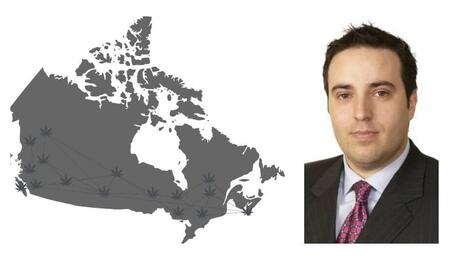Incoming Cannabis Wheaton president Hugo Alves on the state of the industry

Alves talks regulations, investor fatigue, diversity and his hopes for the future of Canadian cannabis
We caught up with Hugo Alves, the newly-appointed Cannabis Wheaton president and director, to get his insight on some of the industry’s hottest issues, from marketing regulations to investor fatigue—and, of course, what the future holds for Cannabis Wheaton and the Canadian cannabis industry at-large. Congratulations on your new post with Cannabis Wheaton. That’s a big job - where do you start? As soon as our financing closes here, then we’ll start our due diligence on streaming partners, with a view to deploying capital to them as quickly as possible. So that’s one big aspect. The second is to execute our strategy of building brand equity for the partners and ourselves, which we’ll be doing aggressively for the next 12-18 months. For us it’s all about helping the streaming partners being the most dominant partners they can be. And when you say streaming partners, that’s exclusively licensed producers, right? Will you be bridging out to other businesses? It’s licensed producers and licensed producer applicants, because those are the only companies that can cultivate cannabis legally at a commercial scale right now. But what I love about the model itself is that it’s nimble enough to respond to changes in regulation very quickly. So if, for example, the regulations passed under the Cannabis Act allowed for a different type of cultivation—whether it be cooperative, or craft, or however you want to term it—that’s definitely something we would look at. We want to be an industry hub and we want to be inclusive of all industry participants. Does that include branching into subsidiary products like edibles or topicals? Well, the beautiful thing about the platform is that we get an allocation of cultivation yield. So ideally our streaming partner sells all of it, and we just take a royalty. But [that can change] as new products come online. They won’t all come online at the same time, and edibles probably won't be part of the first wave of regulated products under the Cannabis Act—think of it as the government effectively unlocking shelf space as you go along. Easy example: the government removes the 3 per cent THC cap off the cannabis oil, and that opens up the market for disposable vape pens. If you’re a licensed producer, you go, ‘Well I want to get into that market, but right now I'm selling 90 or 100 per cent of my dried, finished goods to medical patients or rec patients’. You’re going to need to find supply if you're really going to enter that market, and you find supply by either increasing your yield, expanding your facility, or acquiring it—going out into the open market and buying wholesale product, which is expensive because of the scarcity of supply relative to demand. But with us, we can allocate a portion of our production yield into those derivative products. For example, we can aggregate all of our streams or a portion of our streams, and shift them to one of our streaming partners that we think is a fantastic extractor or processor, then manufacture them so we control the product throughout the process. We can manufacture the pens, and we can ship them out through our distribution channels, whether that’s back to our streaming partners, so now they can offer those products in their stores without it eating into their supply. This all sounds very promising, but still, cannabis stocks are down. There’s a lot of volatility in this—it’s kind of uncharted territory, and certainly I don't think you're going to find anyone in the financial markets that’s going to tell you that companies today are valued at what they would be valued if it was any other industry. There is a healthy dose of optimism built into the evaluations that are currently out in the marketplace. That sounds like a diplomatic way of saying cannabis stocks are overvalued. Well, the market is the market. Overvalued, undervalued–those are things that analysts use in terms of what’s a good buying or selling opportunity, but at the end of the day these companies are worth what they’re worth because someone is willing to pay that for them. There is a healthy dose of optimism. People want to get in because they recognize it’s early days, it’s the end of prohibition, there’s never been another incident in our industrial history like what’s about to happen...So people are kind of looking towards the recreational regime and making a bet, and that’s resulting in the higher prices. But bad news can swing the pendulum. Or, sometimes it’s just an uptick in another sector....so when people have more choices, maybe it’s harder for the cannabis companies to get the dollars. But in terms of whether or not there’s value there, I don’t buy into these theories of some of the older, stodgier financial analysts, that go, ‘Oh no, this market is just a lot of bluster.’ It’s not bluster, it’s the start of an industry that is unprecedented in our industrial history. As someone who has staked my career on the success of this industry, I like your optimism. Yet, I’m hearing a lot about investor fatigue… Yes, there’s investor fatigue, for sure. When I started in this space in 2013, there were a handful of names you could invest in. Now there’s lots of opportunity. There will be companies that fail, there will be winners and losers like everything else. I think investors are starting to get a little fatigued with hearing similar stories about cultivation licenses, where the core business is just cultivation and they don’t have a plan. I think for those people, raising capital is still doable, but it’s not going to be as easy as it was for the early movers, and that’s just normal. It’s harder for investors to differentiate between similar companies, and it’s hard for consumers, too. How are you going to educate consumers so they can differentiate between companies that might all appear to be selling the same thing? The key differentiator between who the winners and losers are in the industry are those who can build brand equity for themselves. What makes a great brand? What appeals to you? Ultimately we’re dealing with cannabis. You know, it’s not a molecule that's exclusive to any one person...The cultivator has to decide what their brand stands for, whether they want to be the lowest cost producer or the highest quality connoisseurs’ choice, very pharma focused or rec focused. Then, it’s how do they execute that branding strategy? If you’re not thinking about your brand at all, then you’re going to have a really hard time differentiating your product from other people’s products, especially when the marketing and advertising prohibitions in the Cannabis Act take hold. That’s going to be a challenge if the restrictions go the way of tobacco regulations. How do you plan to address it? Look, if I said to you, ‘Do you know what a Marlboro is?’ Yes. Of course you do. In your mind you have images of Marlboros, that cool, cowboy type of brand, right? Yes, but that was developed before all the restrictions. Right, there’s equity there, there’s equity that resonates with a big market. If I said, ‘Do you know what a Next’ is?’ No. In all the times I’ve asked people, I've met one person who knows what it is. Next is a brand of tobacco cigarette, but did not come on the market until after the tobacco restrictions were put in place. So even though it’s been on the market for a while, it’s built very, very little brand equity, not that it hasn't tried...That’s why one of the core strategic elements that we’re going to be focused on, and why we have a chief creative law officer as part of our senior executive team, is that we can build value for ourselves and our streaming partners, by helping them focus on brand equity now, while we’re in a restrictive environment, but not a prohibited environment. You don’t have much time. I know, we don't but look, everyone’s in that boat. I would say there’s probably one or two licensed producers that have built significant brand equity. And then there are other companies out there—Lift being one of them and Tokyo Smoke being another—and there’s a bunch in the grey market that have brands that are suitable for the rec market where there’s significant brand equity. And those brands will be valuable, because if a company can’t build it fast enough, the natural default is to buy it. Another big issue that’s getting a lot of press these days is diversity in senior management, or the lack thereof. Cannabis Wheaton’s website says that it aims to create “a world class industry based on diversity, quality, and innovation,” but I don't see, and correct me if I’m wrong, but I don’t see a lot of women or people of colour on your board or management team. In this presentation it’s less about diversity in the workplace, and more about diversity in our partners. So if you look at our portfolio of partners, they’re geographically diverse, they’re diverse in the style of cultivation. So it’s about diversity as a risk mitigation tool, about what works best and what appeals to what market segment. But all that being said, you know I completely agree with you. One of the things I love about the cannabis industry is that it’s being seized by the Women Grow movement; it’s a chance to change the paradigm about leadership at cannabis companies. There is still a lot of predominantly males in executive positions, but I think that will change, because when you go into the grey market that is dramatically different. There are a lot of powerful female CEOs and business owners, and the next opportunity is, how do you bridge that into the regulated system? So what are you going to do? Look, we’re going to actively look for the best talent. Do we want more diversity in our workforce? Sure, we’ll certainly aim for it. Right now the Cannabis Wheaton team is pretty small. I think for us, the more immediate focus would be to find a suitable board member who is not a male. That's something we’re on the look out for, it’s just we’ve got a lot of balls in the air. We’ve got to focus on the financing first, and on to due diligence, and as we grow, certainly growing diversity in our own team would be something that we’re very open to. Good. Because a lot of us in the industry are watching and will be holding you to that. I think part of it is that, historically, the people to have these networks into the financial community are white men. Yes. And right now the companies that have accelerated the fastest are the ones that have those connections into financial communities. But I see more diversity on boards as an element of good governance, because you want diversity of perspective. For me that’s really the important part, for decisions to be looked at through different lenses and stress tested from different perspectives. It’s early days for us, but it’s something everyone should be looking at. It’s something that my current employer—that’s Bennett Jones—that we take very seriously. If you look at our leadership team, our chief operating officer, our chief creative officer and our chief financial officer are all very strong powerful women. And I’ve seen the benefits of management that includes diversity. Can you think of any issues facing the industry right now that aren’t getting the attention they deserve? One thing we’re going to strive to do through Cannabis Wheaton is really act as a voice for our streaming partners collectively. We think that will be a benefit for the industry as a whole. Right now apart from Lift—which is really agnostic to whether [a company is] licensed or not licensed—it focuses on the industry, as it should. You don't see from a licensed producer perspective. There isn’t a real concerted voice out in the industry, so we’re hoping to do that for our streaming partners, and if that helps the broader industry then that’s great. Is there anything else you that you would like Lift readers to know? I think the next 12 months will be a fantastic time, whether you're already operational or thinking about submitting an application. The factors surrounding the cannabis space have never been this good. Even back in 2013, early 2014, when people were getting licensed relatively quickly because the government needed to build up capacity, you didn't have these conditions that you have today...It’s just a fantastic opportunity. What I’m seeing now is a big influx of very capable people who have had a lot of success in other sectors start applying their ingenuity into cannabis. We’re starting to see different types of products, different types of technologies, different business models, and this is very, very exciting. Author: Devon Scoble Published: June 27, 2017 Website:



